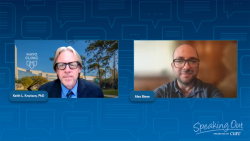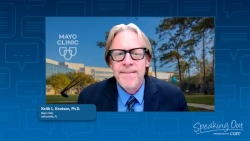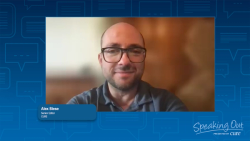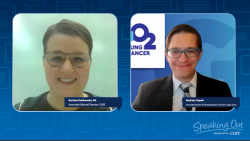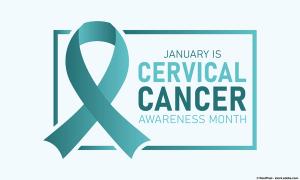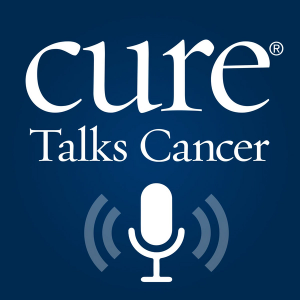Transitioning from Active Care to Survivorship in Women’s Cancer
As part of its Speaking Out video series, CURE spoke with Dr. Navya Nair, on behalf of the Foundation for Women’s Cancer, about survivorship in women’s cancer.
Kristie L. Kahl: What are the challenges that we see when a patient goes from active treatment, and then you know, they're done and they have to go back to their primary care physicians.
Dr. Navya Nair: So, you know, having a patient who just went through cancer diagnosis and intensive treatment, getting back into the game or routine health care and preventative screening so often patients while they're undergoing their cancer treatment can fall behind on their other health maintenance. Tests and so getting them back, get back in plugging them back into routine health care. Um, it's really important, sometimes challenging, having a great relationship with primary care doctors and engaging them even when a patient is on cancer treatment can help that transition back.
Kahl: With that, what are some of the long-term effects that a female with a gynecologic cancer might experience and can you explain the role that a primary care doctor will play in those long-term effects?
Nair: There can be a number of long-term effects after cancer diagnosis and treatment. Sometimes patients have chronic pain issues. Often sexual health can be an issue and side effects like vaginal dryness, decreased libido, body image issues, can also be a problem, especially after dealing with certain types of gynecologic cancers like vulvar cancer. So, not just physical health is important, but also mental health is you get through a cancer diagnosis and resume routine life.
Kahl: We've heard a lot about survivorship care plans, but I think they're still not rolled out everywhere. So can you talk about what these are and you know, hopefully educate our patients a little bit more maybe if they can ask their doctors about what it is and why that might be best for them.
Nair: Absolutely. survivorship care plans are instated after a patient has finished their cancer treatment and what the plan is moving forward to that all providers in that patient's care team know what's happening moving forward. And that includes what surveillance testing or exams they may need for their cancer. And also getting them like I said, plugged back into routine health care screening for other cancers. Others getting their pap smear after a colon cancer diagnosis or, or getting their bone density scan, these are all the things that go into survivorship care plans.
Kahl: To bring it all together, what is your biggest piece of advice for patients to kind of just stay vigilant with their health care after treatment ends for their women's cancer?
Nair: So at the end of their treatment, I encourage all patients to have a really honest and open conversation with their oncologist about what they need to do moving forward for their cancer surveillance. So are there things that they need to pay attention to their body, so that if there's a symptom or something that happens that's concerning for cancer recurrence, they know to get back in with their oncologist. And then the other big piece is having a great relationship with a primary care doctor and knowing what health maintenance thinks they need moving forward and staying on top of all of that.
Kahl: What would you say is your biggest piece of advice for a woman with a gynecologic cancer?
Nair: My biggest piece of advice would be to be a fierce advocate for yourself off and if you are so inclined to be a fierce advocate for others, a lot of progress in the field of gynecologic cancer has been made by survivors of these diseases. So for example, there was there is a network of women created that are cancer survivors called ECONO, which stands for endometrial cancer Action Network for African American and they have been so involved and so engaged in figuring out ways that we can improve cancer treatment for patients that are at high risk for these diseases and, and have out of that group, there's been the first randomized control trial looking at social support and how that can affect cancer outcomes. So be an advocate for yourself. And if you feel so inclined, be an advocate for others and support them. If they have a cancer diagnosis, need to get through that.
Transcription edited for clarity and conciseness.
Related Content
 Lymphedema Myths and Misconceptions, From Exercise to Blood Draws
Lymphedema Myths and Misconceptions, From Exercise to Blood DrawsNovember 13th 2024
 A Survivor and Her Running Shoes
A Survivor and Her Running ShoesSeptember 13th 2018
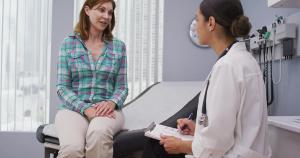 Cancer Brought Me to Sharon in Wonderland
Cancer Brought Me to Sharon in WonderlandMarch 23rd 2024
 Keytruda Has Received Nearly 40 FDA Approvals. How Does It Work?
Keytruda Has Received Nearly 40 FDA Approvals. How Does It Work?January 25th 2024
View additional resources on CureToday.com

